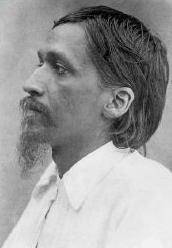
Sri Aurobindo Vol 8 Karmayogin – Sri Aurobindo launched the Karmayogin, “A Weekly Review of National Religion, Literature, Science, Philosophy, &c.,” on 19 June 1909, six weeks after his release from jail on conclusion of the Alipore Bomb Trial. Between then and February 1910, when he left Calcutta, he edited this journal, writing most of its contents himself. In addition to articles on political and related matters, the Karmayogin contained essays on philosophy, yoga, education, art and literature, as well as translations and poetry. Download the entire volume (488 pages) number 8 in the collected works as a free PDF Ebook:
 Karmayogin by Sri Aurobindo
Karmayogin by Sri Aurobindo
Karmayogin: Political Writings and Speeches by Sri Aurobindo is a seminal collection that captures the essence of his early political thought and activism during the struggle for India’s independence. Originally published in the weekly journal Karmayogin between 1909 and 1910, these writings reflect Sri Aurobindo’s profound insight into the interplay between spirituality and politics.
In this compilation, Sri Aurobindo articulates his vision of nationalism rooted in spiritual awakening and moral development. He emphasizes that true freedom extends beyond political independence to include the cultural, spiritual, and intellectual liberation of the people. His essays address critical issues of the time, such as colonial oppression, the importance of self-reliance, and the need for a unifying national identity.
Sri Aurobindo advocates for passive resistance and the development of inner strength as essential tools in the fight against colonial rule. He discusses the concept of Karmayoga, the path of selfless action, urging individuals to perform their duties with dedication and without attachment to personal gain. This philosophy serves as a guiding principle for societal transformation and the upliftment of the nation.
The book also delves into the role of education, culture, and religion in shaping the future of India. Sri Aurobindo calls for a revival of India’s ancient spiritual heritage to inspire and guide the modern independence movement. His writings encourage a synthesis of Eastern and Western values, promoting progress while remaining true to indigenous traditions.
Karmayogin: Political Writings and Speeches offers valuable insights into the mind of one of India’s foremost thinkers and freedom fighters. It provides historical context to the independence movement and sheds light on the spiritual dimensions of political activism. The book remains relevant for readers interested in philosophy, history, and the ongoing quest for social and spiritual evolution.
